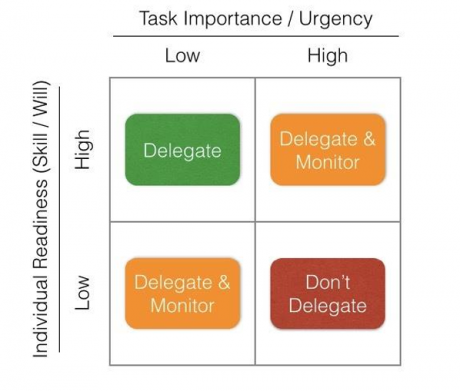Effective delegation
Unlocking efficiency and empowering teams: master the art of delegation and experience the transformative impact of strategic delegation on productivity, employee development, and organisational success.
The benefits of delegation
It is easy to fall into a trap of thinking if you want something done right, then you must do everything yourself. But one person can't do everything, and trying to accomplish or micromanage too many tasks may lead to burnout, poor quality of work or missed deadlines (not to mention time-management problems).
If you are a new manager, it may be that you fear delegating because you:
- lack the confidence to direct others
- lack confidence or trust in who you need to transfer the project to
- think it would take longer to explain the task than actually completing it yourself
- want to feel indispensable to their team by being the keeper of specific knowledge
- enjoy completing certain projects so prefer not to reassign them
- think that your manager may judge that you cannot cope if you delegate to other people
- feel guilty about adding more work onto another employee’s to-do list
Many of the above reasons are valid, but there are so many more reasons why delegation can be beneficial to you, your team and the University.
- What delegation can do for you as a manager
-
It frees up your time for planning and organising
This is an important part of managing any team and it’s difficult to do if your workload is too heavy. -
It helps you to learn how to manage and develop employees
To find out the ability of your team, delegation is a great way to start. -
It keeps you from spreading yourself too thin
Managers need to manage their own workload in order to successfully manage a team. -
It encourages open communication and trust
If you delegate to your team members and encourage questions, they will feel that you trust them and that you are accessible for communication. If your team feel that you trust them and that they can talk to you, you will benefit immeasurably. A team built on trust and open communication is a team poised for success. -
It can show you a better way
Employees who take over a process or job may have a completely new approach, and sometimes it’s an improvement! If you just keep doing things the way you’ve always done them and refuse to allow anyone else to give it a go, there will be no opportunity for new and different ideas and approaches, process improvements, or other potential innovations.
-
- What delegation can do for your team
-
It motivates and builds morale
Employees find it gratifying when their managers delegate to them. For most, this isa sign that they are valued and trusted workers, and that their manager believes them capable of greater success. -
It encourages and stimulates creativity and initiative
If employees feel empowered to accomplish delegated tasks in their own way, they can become both very creative and driven to succeed. Their personal initiative and the desire to reach the goal you have set before them can produce impressive results. -
It develops their skills
Developing your employees through delegation and helping them to learn new skills not only benefits them but creates an organisation with more qualified and better trained staff. -
It allows staff to contribute significantly to team success
Employees will relish the recognition that comes with doing something that makes a difference. They will experience pride and a sense of accomplishment from making a significant contribution.
-
- What delegation can do for your organisation
-
Delegation will benefit your team, your department and your organisation.
It fosters trust, boosts morale, promotes high productivity and efficiency, and generates a culture of enthusiasm, innovation, creativity, cooperation, and openness. It will reduce employee turnover and furnish the organisation with better-qualified, more skilled employees.
What tasks to delegate
It’s not always easy to identify which tasks you should be delegating. Try mapping your tasks using the following model.

If you have a task that has high importance/urgency and you don’t have the skills within your team, then don’t delegate.
For tasks that are of high importance/urgency, it may be safe to delegate the task to a skilled team member, but make sure you monitor the work.
Tasks that are of low importance/urgency are ideal to be delegated to a skilled/willing team member. However, for similar low urgency tasks where there are not the right skills within your team, you may still delegate, but will need to monitor also. This can be a great development opportunity for the staff member.
Simple steps for effective delegation
-
Define the task
Confirm in your own mind that the task is suitable to be delegated. -
Select the individual or team
What are your reasons for delegating to this person or team? What are they going to get out of it? What are you going to get out of it? -
Assess ability and training needs
Is the other person or team of people capable of doing the task? Do they understand what needs to be done? If not, you can’t delegate. -
Explain the reasons
You must explain why the job or responsibility is being delegated. And why to that person or people? What is its importance and relevance? Where does it fit in the overall scheme of things? This is an opportunity for development and empowers the individual(s). -
State required results
What must be achieved? Clarify understanding by getting feedback from the other person. How will the task be measured? Make sure they know how you intend to decide that the job is being successfully done. -
Consider resources required
Discuss and agree what is required to get the job done. Consider people, location, equipment, materials, other related activities and services. -
Agree deadlines, feedback and how progress will be measured
When must the job be finished? Or if an ongoing duty, when are the review dates? How often will you need to meet for them to update you on progress and for you to provide constructive feedback? Where else might feedback come from? How else do you need to be kept informed? -
Support and communicate
Think about who else needs to know what’s going on and inform them. Involve the other person in considering this so they can see beyond the issue at hand. Remember that the outcome of delegation is still your responsibility, so you will need to provide the right level of support, appropriate to the task you are delegating. -
Feedback on results
It is essential to let the person know how they are doing, and whether they have achieved their aims. If not, you must review with them why things did not go to plan, and deal with any problems. You must absorb the consequences of failure and pass on the credit for success.
How to Delegate Effectively workshop
Organisational Development offer the How to Delegate Effectively workshop as part of the Management Essentials programme. View the Organisational Development events calendar to see upcoming workshop dates and book a place.
The workshop covers:
- The benefits and common barriers of delegation
- Different approaches to delegating tasks
- Ways that you can apply these approaches within your team to improve motivation and team performance.
Participants will also benefit from gaining insights from colleagues across the University.
Relevant training on LearnUpon
These courses typically take less than an hour to complete and can be accessed at a time and place to suit you. You will need to log in to LearnUpon for the links below to take you directly to the course. Alternatively, you can search the course title in the LearnUpon catalogue.
How to Delegate
Delegating is one of the key tools that a manager has to develop and motivate the individuals on their team. While it requires an investment of time and effort at the outset, giving people the space and time to carry out activities that will stretch and challenge them can be hugely beneficial in the long run, as it supports staff development and builds motivation and gives managers more time to focus on other aspects of their role.
This course looks at how to delegate effectively by identifying the tasks that are appropriate to delegate and sets out ways to structure and monitor them in order to ensure that the goals of the organisation are met and that professional development occurs in the process. Complete the How to Delegate training on LearnUpon.
Motivating People
At the most basic level, we’re driven by simple needs – such as being safe or having enough to eat – but once these fundamental requirements are satisfied, what motivates us or gives us purpose varies considerably from person to person, and workplaces are made up of individuals with very different and sometimes contradictory motivators. Understanding individual motivation and how it affects our behaviour and engagement at work is a key skill for leaders who want to attract and retain talent, maximise productivity and steer their organisations through periods of change and uncertainty.
Complete the Motivating People training on LearnUpon.
Further resources
You might also be interested in:
Contact and advice
Organisational Development
Sussex House SH-230
od@sussex.ac.uk
01273 075533 (ext 5533)

